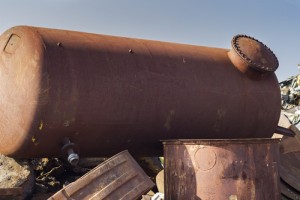 New Jersey Public Television (NJTV) recently completed a broadcast of a three-part expose on the dangers and difficulties stemming from as many as 100,000 underground storage tanks that remain in the ground throughout the state. In very stark terms the NJTV report warns that some of the sites are “nightmares” and “environmental ticking time bombs”, posing an immediate threat of contamination from seepage into ground water and basements in heavily populated areas.
New Jersey Public Television (NJTV) recently completed a broadcast of a three-part expose on the dangers and difficulties stemming from as many as 100,000 underground storage tanks that remain in the ground throughout the state. In very stark terms the NJTV report warns that some of the sites are “nightmares” and “environmental ticking time bombs”, posing an immediate threat of contamination from seepage into ground water and basements in heavily populated areas.
These old storage tanks, both above and underground, are from homes, gas stations and dry cleaning sites – closed or currently in operation – where the chemicals have leaked over time. The chemicals include fuel, PCP (dry cleaning fluid) or VOCs like degreasers and other chemicals used in automotive or other manufacturing sites. As storage tanks are prone to corrosion, some of the chemicals have leaked into the soils and then leached into the groundwater. This is true of almost every tank that was built or installed more than ten to fifteen years ago, when the technology was changed to build tanks with several layers of protection. Often neighboring businesses’ tanks release chemicals into the soil which then leaches into the groundwater and combine to form “plumes” of contamination in the ground water, which flow with the groundwater in underground channels to other properties. One of the main concerns is that these plumes of contamination can reach areas where drinking water wells draw water from the contaminated groundwater or where the chemicals in the plume “off gas” as vapor upwards through the soil into buildings and homes. These scenarios present very real risks to human health and welfare.
All expletives aside, the problems and risks stemming from these buried and abandoned underground storage tanks perfectly illustrate the reason we need a new approach to solve long-standing environmental cleanup problems. As the NJTV reporters observed, the NJ Department of Environmental Protection is simply overwhelmed by the magnitude of the problem. Given budget limitations and the protracted legal process involved when regulators move to compel cleanup, the NJ DEP has essentially been performing radical triage, focusing its resources on the situations needing immediate attention, which likely will result in the vast majority of these storage tanks remaining in the ground – and the contamination remaining in the groundwater — for many years to come. [Read more…]


